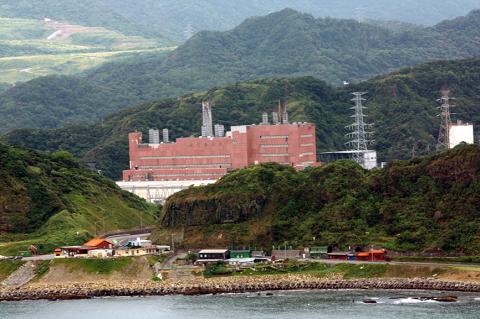The government would not be able to reach the power reserve margin target it set for 2025 if fails to commence operations at the coal-fired Shenao Power Plant (深澳電廠) as scheduled, the Ministry of Economic Affairs said yesterday.
The nation is likely to see a power shortfall by 2025, as the reserve margin is expected to decline 1.4 percent if the plant does not come online in July that year, the ministry said in a statement.
The government aims to improve the margin to 15 percent after next year from 7.1 percent this year by accelerating construction of several power plant projects, including expanding the Shenao plant in New Taipei City’s Rueifang District (瑞芳).

Photo: CNA
Upgrading the plant would ensure a stable power supply and improve energy efficiency, the ministry said, adding that the facility’s lower heating value — its efficiency taking into account the energy lost as water evaporates during combustion — is forecast to grow to 45 percent from 38 percent after the upgrades are completed.
Upgrades at the coal-fired Linkou Power Plant (林口發電廠) in New Taipei City are finished, the ministry said, adding that it would strike a balance between efficiency and environmental protection when upgrading the Shenao plant.
With more advanced equipment, the facility would be capable of reducing sulfur oxide and nitric oxide emissions, it added.
The ministry’s remarks came after the plant on Wednesday passed an environmental impact assessment, triggering renewed criticism over worsening air quality in northern Taiwan.
Environmental groups consider the Shenao plant upgrade to constitute a new project, as the original facility was mothballed in 2007 before being demolished in 2011, local Chinese-language media reported.
The government should invest more resources in the development of renewable energy resources, instead of generating coal-based energy, environmental groups have said.
The ministry said it assessed the possibility of replacing coal with natural gas at the Shenao plant, but the site does not have the space required to store the fuel.
Despite the government’s goal of generating 20 percent of the nation’s electricity from renewable sources by 2025, the ministry said it is still necessary to partly rely on coal-generated energy to ensure a stable energy supply.
Taiwan, an energy-dependent nation that imports nearly 98 percent of its fuel, is susceptible to fluctuations in global energy prices, the ministry said.
Coal-generated energy is seen as a more stable energy resource compared with renewable sources, as coal can be stored for 30 days, it added.

POWERING UP: PSUs for AI servers made up about 50% of Delta’s total server PSU revenue during the first three quarters of last year, the company said Power supply and electronic components maker Delta Electronics Inc (台達電) reported record-high revenue of NT$161.61 billion (US$5.11 billion) for last quarter and said it remains positive about this quarter. Last quarter’s figure was up 7.6 percent from the previous quarter and 41.51 percent higher than a year earlier, and largely in line with Yuanta Securities Investment Consulting Co’s (元大投顧) forecast of NT$160 billion. Delta’s annual revenue last year rose 31.76 percent year-on-year to NT$554.89 billion, also a record high for the company. Its strong performance reflected continued demand for high-performance power solutions and advanced liquid-cooling products used in artificial intelligence (AI) data centers,

SIZE MATTERS: TSMC started phasing out 8-inch wafer production last year, while Samsung is more aggressively retiring 8-inch capacity, TrendForce said Chipmakers are expected to raise prices of 8-inch wafers by up to 20 percent this year on concern over supply constraints as major contract chipmakers Taiwan Semiconductor Manufacturing Co (TSMC, 台積電) and Samsung Electronics Co gradually retire less advanced wafer capacity, TrendForce Corp (集邦科技) said yesterday. It is the first significant across-the-board price hike since a global semiconductor correction in 2023, the Taipei-based market researcher said in a report. Global 8-inch wafer capacity slid 0.3 percent year-on-year last year, although 8-inch wafer prices still hovered at relatively stable levels throughout the year, TrendForce said. The downward trend is expected to continue this year,

Vincent Wei led fellow Singaporean farmers around an empty Malaysian plot, laying out plans for a greenhouse and rows of leafy vegetables. What he pitched was not just space for crops, but a lifeline for growers struggling to make ends meet in a city-state with high prices and little vacant land. The future agriculture hub is part of a joint special economic zone launched last year by the two neighbors, expected to cost US$123 million and produce 10,000 tonnes of fresh produce annually. It is attracting Singaporean farmers with promises of cheaper land, labor and energy just over the border.

US actor Matthew McConaughey has filed recordings of his image and voice with US patent authorities to protect them from unauthorized usage by artificial intelligence (AI) platforms, a representative said earlier this week. Several video clips and audio recordings were registered by the commercial arm of the Just Keep Livin’ Foundation, a non-profit created by the Oscar-winning actor and his wife, Camila, according to the US Patent and Trademark Office database. Many artists are increasingly concerned about the uncontrolled use of their image via generative AI since the rollout of ChatGPT and other AI-powered tools. Several US states have adopted